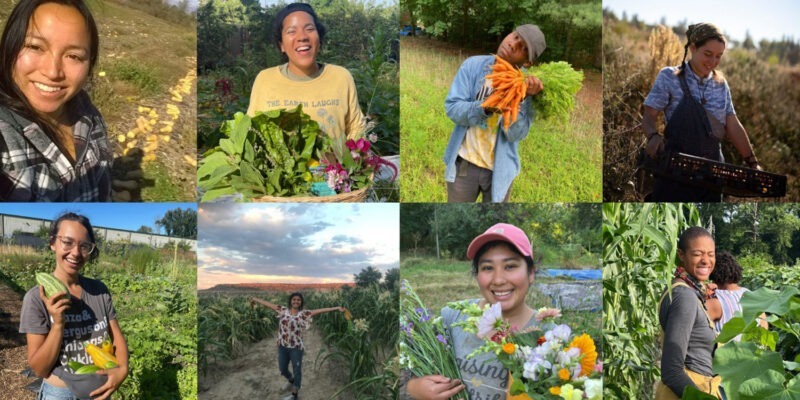This post is also available in: Español (Spanish) Kreyòl (Haitian Creole)
Equitable access to farmland and the healthy food that it can provide are central, but often overlooked, parts of making sure children and families thrive. Creating equitable access to farmland, especially for Black, Indigenous, and people of color (BIPOC) farmers, often takes policy change. That’s why the work of the National Young Farmers Coalition (Young Farmers) is so important. From shaping the Farm Bill to organizing BIPOC farmers to take advantage of opportunities presented by the Increasing Land, Capital, Market Access program, they have had tremendous wins that are shaping the future of agriculture in the United States.
“There is just so much tied to agriculture…like shared cooking and shared meals with people, relationship development and community, and stewarding the earth,” said Michelle A.T. Hughes, co-executive director of the National Young Farmers Coalition.
She helps lead this grassroots organization of about 200,000 farmers and ranchers who envision a just future where farming is free of racial violence, accessible to communities, oriented towards environmental well-being, and concerned with health over profit. Their mission is to shift power and change policy to equitably resource the next generation of working farmers. As a former young farmer of color herself, Hughes explains the importance of centering the voices and lived experiences of other BIPOC farmers in everything the Coalition does.
Equity and accountability starts internally
In 2020, Hughes authored an accountability report as part of the racial equity transformation that has made Young Farmers a vanguard for other organizations committed to equity. As part of a year-long impact assessment, Hughes met with each program director at the organization to talk about every aspect of their program, from stakeholder relationships, administrative processes and hiring compensation, to conversations about the kind of farmers they were servicing. After identifying gaps that existed, the Coalition rolled out tools including evaluation strategy, compensation guidelines and hiring practices that have sparked a noticeable change in the culture through a very holistic approach.
Katherine Un, Hughes’ co-executive director, said, “We’re young farmer-centric through and through. Our board, by our bylaws, is and will continue to be for the foreseeable future majority-BIPOC farmers, and currently the board is majority young BIPOC farmers.” This staff and board makeup, and the care and passion that comes with that, is what she believes is the secret ingredient to Young Farmers’ organizing efforts. A diverse staff and board with direct farming experience help shape and hone programs that are all “designed and run on the tenet that farmers are their own best advocates and stories are our strongest means to change the hearts and minds and shifting policies,” Un said.
Organizing for change
As always, organizing and activating comes with its challenges. For Young Farmers, it is nurturing confidence in the belief that the government will actually hear these young diverse voices and that policies will indeed shift. But the Coalition is unwavering in this belief and takes that conviction toward equity and sustainability into each space they enter.
Now, after 10 years of organizing, the coalition has had some big wins that have helped foster this confidence during challenging times.
Land access
One such win is the Increasing Land, Capital, Market Access program. Young Farmers led a rapid response when the program was announced to help 19 BIPOC-led organizations apply for funding for community-led land access projects. Thirteen of those organizations were awarded funding. For the majority of young farmers, attaining secure access to farmable land is their biggest challenge. Young Farmers was able to advocate for and advise on this $300 million USDA program to help make that vision a reality.
Equitable access to land is the Coalition’s top priority. Land access, along with programs that steward and support a diverse population of young farmers, will help lead to equitable and resilient food systems for generations to come. In the United States, access to land is the number one barrier facing young farmers, and that access is an even greater challenge for farmers of color. Along with partners such as the National Sustainable Agriculture Coalition and the Land Loss Prevention Project, the National Young Farmers Coalition is working on an effort to improve farm access for the next generation of farmers.
Mental health support for farmers
Another point of pride for Young Farmers is that they have a touchpoint all the way down the ladder, not just advocating for the future of farming at a structural level but at an individual level with the well-being of the farmworkers themselves. The Coalition has invested in some deep and meaningful work around farmer mental health. Hughes describes the family and financial stress and lack of hope around the future of their careers weighing heavily on many farmers. The work is exhausting and often extremely isolating. These sorts of pressures have led to agricultural workers experiencing suicide rates that are 50% higher than the national average.
In the last Farm Bill, the coalition and their allies advocated for and won $20 million in farmer mental health funding. That funding was split up into five regional grants and the Coalition was awarded funding for the Northeast region which they used to develop and implement Cultivemos. Cultivemos is a farmer-led program taking a holistic approach to addressing farmer mental health through accessible and culturally-competent resources and care. They deliver direct services like a telephone hotline and resource library in Spanish and English. Cultivemos also takes a structural approach by doing more indirect work to educate and resource other institutions and organizations to help create an accessible and culturally-competent network that meets the unique needs of agricultural workers.
Farming is a calling
The National Young Farmers Coalition understands that for many, agricultural work is more than an economic and social bedrock of our country – it is their calling to have their hands in the soil. They are creating community, livelihoods, and culture. They are also thoughtful about stewarding the land and natural resources so that they may sustain future generations. Hughes reflects, “There’s nothing else that I could ever do that would be as rewarding as farming … You are a human, with purpose to be here, to regenerate.”
Young Farmers’ vision is bold. They stand in solidarity with global movements that are advancing the right to food and place. “We believe we have one generation to transform agriculture in service to our communities and the land,” Hughes said. “We are that generation.”








Comments